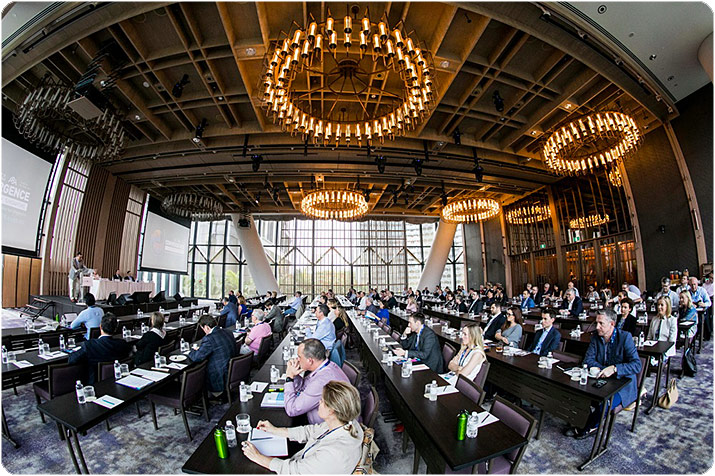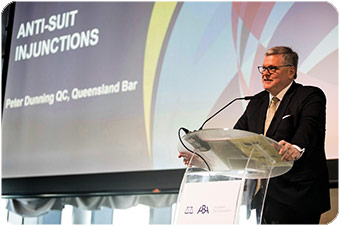Several members of the Queensland Bar recently attended the Australian Bar Association’s international conference in Singapore on 11 and 12 July.
The program consisted of both plenary sessions and smaller streams exploring a diverse range of issues from consideration of the need for an international commercial court for Australia to cross-border insolvency and third-party litigation funding.

The conference was opened by a joint address by the Honourable Chief Justice Kiefel AC of the High Court of Australia and the Honourable Chief Justice Menon of the Supreme Court of Singapore. Their Honours spoke about the common legal heritage of Australia and Singapore as well as the developing institutional bonds between the courts and legal professions of both countries. Engagement by the Bar as a whole with the broader profession and in the region was a focus of the conference. Sessions including a panel of senior in-house counsel, issues in international arbitration and the report prepared by the Honourable Roger Gyles AO QC on opportunities for Australian barristers in international arbitration. There was a strong feeling among presenters that Australian counsel were under-represented in international arbitration work compared to other overseas lawyers, and particularly members of the London bar.

Practical skills and practice development were also covered across the conference, including sessions on ‘the seven deadly sins of oral advocacy’, digital practice management and expert evidence. Junior members of the bar were particularly appreciative of the opportunity to sit down with senior counsel from around the country at a ‘meet the silks’ session.
Contributions by Queenslanders to the program were well received, with presentations by Peter Dunning QC (anti-suit injunctions), Cate Heyworth-Smith QC (a comparative discussion of ethics in advocacy) and Kathryn McMillan QC (expert evidence – 21st century challenges).

Convergence 2019 concluded with a black tie dinner (with big band) at the magnificent Clifford Pier, capping off a lively program of social events which also included arrival rooftop drinks and a welcome event at the National Gallery of Singapore.
Conference chair Dominique Hogan-Doran SC and her team deserve congratulations for putting together an engaging and comprehensive program. From Singapore, the ABA National Conference returns home, being co-hosted by the Queensland Bar in combination with our annual conference.
Save the date: 2020 BAQ ABA Conference, 5-7 March 2020, W Hotel Brisbane
Jules Moxon, Barrister
A recent consideration of using extrinsic evidence and implied terms of good faith in commercial contracts.
By Jules Moxon
In the latest of a lengthy series of disputes surrounding the construction and operation of the Wiggins Island Coal Expert Terminal, Jackson J has found that complex contracts between sophisticated commercial parties are subject to an implied obligation of good faith. His Honour’s decision also addresses the requirement of an ‘ambiguity gateway’ for the admission of extrinsic evidence, a matter expressly left open by previous authority.
Background
The defendants were a number of coal companies who entered into relevantly identical agreements (‘WIRP Deeds’)1 with Aurizon for the funding and construction of a rail line from their respective mines to the Wiggins Island Coal Export Terminal. Each defendant was allocated a particular ‘segment’ of the rail line, in respect of which they were required to make payments to Aurizon. The WIRP Deeds also included a term which provided that a customer could withdraw from a segment by giving notice to Aurizon by a certain stage of works and thereby be relieved of their obligation to make payments in respect of that segment (the ‘notice of withdrawal’), provided there was at least one remaining customer who would continue to use that segment. Having given a notice of withdrawal, the customer could still use the segment even though it was not paying the relevant fee.
Each of the defendants gave notices to Aurizon, which, if valid, would have the effect of casting the whole of the obligation to pay fees in respect of each railway segment onto a single customer. While it was not expressly referred to in the reasons, that would likely have had the result that Aurizon would not have recovered its substantial investment (or at least have made recovery much less likely), described by Jackson J as ‘a superficially bizarre game of musical chairs’.2
Aurizon sought declarations that each of the notices of withdrawal given by the defendants was invalid. Relevantly, it argued that evidence of negotiations and surrounding facts supported a construction that the defendants were not entitled to give notices of withdrawal, and that the defendants were in breach of an implied obligation to act in good faith towards, and deal fairly with, Aurizon in giving a notice of withdrawal.
The decision discusses two important matters of principle regarding the construction of commercial contracts: the ambiguity gateway and implied terms of good faith.
Ambiguity Gateway
Aurizon sought to admit evidence of the negotiations with the defendants to construe the contractual provision governing notices of withdrawal.
It is an open question whether ambiguity is required before a court may have regard to extrinsic evidence in construing a contract. In New South Wales, no ambiguity is required.3 The contrary view has been expressed in Victoria and4 Western Australia,5 and cited with approval by the High Court in Victoria v Tatts Group Limited [2016] HCA 5.6
Jackson J considered that extrinsic evidence was admissible if the ordinary meaning of a commercial contract, notwithstanding that the words used were clear, would lead to ‘some absurdity’.7 He referred to older authorities showing that contrary to the prevailing view, it was not invariably the case that extrinsic evidence would only be referred to in cases of ambiguity.8
While his Honour was prepared to admit evidence of negotiations, he emphasised that it must be the case that ‘something has clearly gone wrong with the language’.9 He considered that, in the case of the WIRP Deeds, it had. However, notwithstanding that he was prepared to admit the extrinsic material sought to be relied upon by Aurizon, his Honour concluded that it did not assist in achieving the construction contended for.
Accordingly, he turned to consider Aurizon’s argument that the WIRP Deeds included an implied term that the defendants would act in good faith and fairly deal with the plaintiff in giving a notice of withdrawal.
Implied term of good faith and fair dealing
Like the question of the ambiguity gateway, it is to some extent unsettled whether commercial contracts or the exercise of contractual powers are subject to an implied duty of good faith and fair dealing. While the High Court has expressly left the question open,10 as has the Victorian Court of Appeal,11 courts in New South Wales have long accepted that contracts may be subject to an implied term of good faith and fair dealing, as has the Full Federal Court.12
His Honour did not expressly resolve the apparent conflict of authority as to whether a term of good faith and fair dealing is implied into all commercial agreements, but instead proceeded to ask whether the implied term sought by Aurizon satisfied the test for the implication of terms in fact in BP Refinery Westernport) v Shire of Hastings (1977) 180 CLR 266.13 He was persuaded that it did, being struck particularly by the apparently perverse consequence that customers could effectively pass on their liability to pay Aurizon to a single customer while continuing to use infrastructure Aurizon was under no obligation to build but for the WIRP Deeds.14
Having concluded that the defendants were required to exercise their right to give a notice of withdrawal in good faith, Jackson J concluded that each of the customers had given the notice to avoid paying fees to Aurizon.15 That, he said, was not acting in good faith.
Conclusion
His Honour’s reasons are a comprehensive review of recent authority on two central, yet unresolved, points in the construction of commercial contracts.
The decision also serves as a warning that it will be no barrier to construction or implication of terms that a contract is of some complexity, or that it was negotiated at arm’s length between well advised, sophisticated parties.




